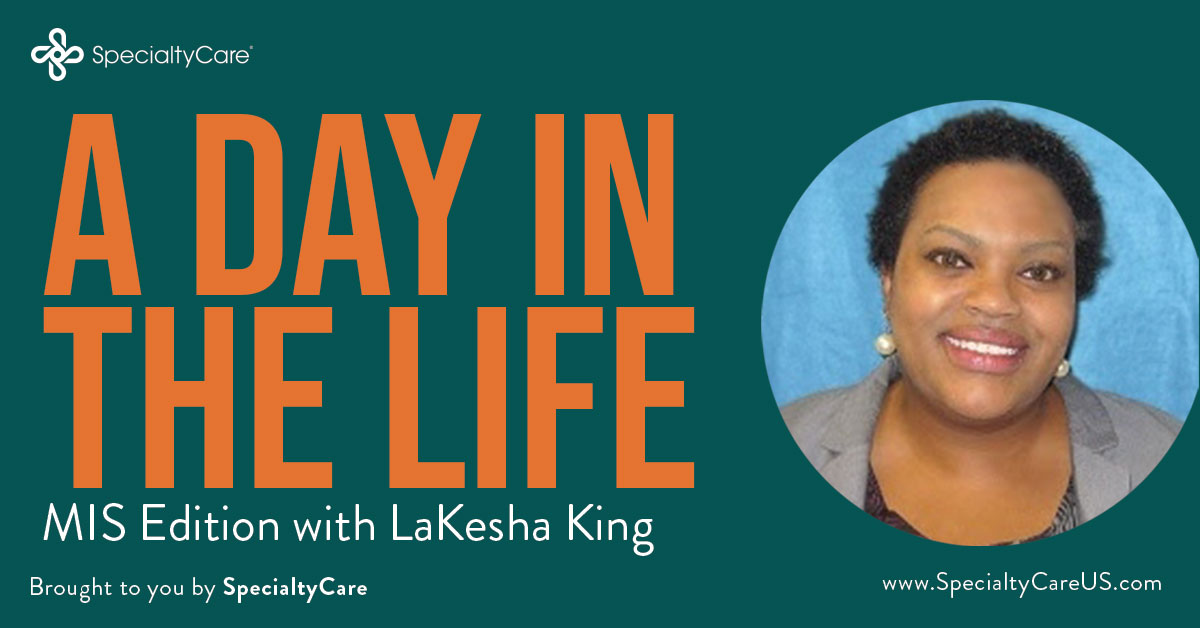Throughout Minimally Invasive Surgery (MIS) Week, we’re highlighting some of our amazing SpecialtyCare staff. These individuals make a significant impact every day, and we’re excited to acknowledge their notable contributions to MIS.
How long have you been a minimally invasive clinical specialist and which team are you currently on?
I’ve been a minimally invasive clinical specialist for 7.5 years. I started on the team in Richmond, VA. After spending 3.5 wonderful years with the team, I relocated and joined the amazing MISS team in South Florida.
What led you to become interested in MIS, and can you describe the path you took to become a minimally invasive clinical specialist?
I was working in the hospitality industry, and two of my friends were clinical specialists with SpecialtyCare. I wasn’t familiar with the company nor did I have a previous interest in the medical field as I was a liberal arts major in college. The more I heard about SpecialtyCare and the role of the minimally invasive clinical specialist, the more intrigued I became. Finally, I was sold on the company and the role, so I decided to apply. I’m so glad I took a leap of faith because I’m able to make a positive impact on patient care every day.
What are the benefits of a career in MIS?
There are many benefits associated with a career in MIS. It’s very fulfilling knowing that I play a role in many different departments and processes throughout the facilities that my teams support. As a clinical specialist, a day doesn’t go by without impacting lives, directly or indirectly.
What is a day in the life of a minimally invasive clinical specialist like?
A day in the life of a minimally invasive specialist is very fast-paced and can often be unpredictable. It’ll vary from one account to the next but, overall, the premise is the same. Our days start early in the morning when we arrive at the facility to quickly assess the Sterile Processing Department (SPD). Afterward, we venture into the Operating Room to see what cases we have that day. Once we know the schedule, it’s time to hit the ground running.
Our teams typically arrive before the OR staff to prepare for the day and set the facility up for success. We go to each room and set up the first start procedures of the day. “Setting up” consists of bringing any equipment into the room and ensuring its functionality—another reason why we arrive early to begin set up. If something is malfunctioning, it allows us to troubleshoot and replace any instruments or equipment if necessary.
We also gather instrumentation for the surgical technician and help spread and open the room. This allows the circulating nurse to focus on the patient which allows for on-time starts, ensuring things continue to flow efficiently in the operating room. Often, we’ll have multiple rooms to balance and provide the same excellent service simultaneously.
When everything is set up and ready to go in the operating room, it’s time to jump to SPD while awaiting cases to start. This is when multitasking comes into play. Based on the initial SPD assessment, we handle anything that needs to be taken care of, including but not limited to: washing instrumentation, performing quality checks, reprocessing, etc. Depending on the account, specific team members might be dedicated to a particular role with someone floating between to assist. In other cases, there might be one associate playing a juggling act between the departments we serve, depending on the service model.
When cases start, the specialist is present to assist and provide another set of hands for the OR team. This is the general dance we do throughout the day. Even certain specialists offer services to multiple accounts within the same day. In the South Florida region, we have many facilities spread over extensive miles, so we often joke with our DO that a hovercraft and helicopter are needed for our day-to-day operations to be successful. We’re patiently awaiting those additions. One specific thing is that the role of a clinical specialist is unpredictable, and there’s never a dull moment. This is part of what makes the role exciting.
What communication advice would you give when working successfully in a team dynamic?
Communication is pertinent for the success of any team. My advice is to make sure that there are multiple platforms for communication so that all members of the team stay informed. Some methods I use with my teams are group text messaging threads (this allows updates to be delivered in real-time), daily communication logs, and holding frequent team meetings. These methods enable constant communication and keep everyone in the know and part of the process. This also helps build trust amongst team members, playing a pivotal role in forming a successful team dynamic.
What was a surprise to you about the career when you first started?
A clinical specialist’s impact on a customer and how they can make a massive difference in the role’s daily routine surprised me. Each day is different, and there’s never a dull moment. The appreciation for this field speaks volumes.
